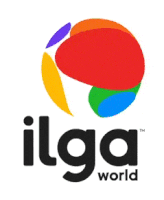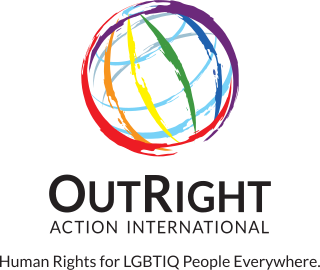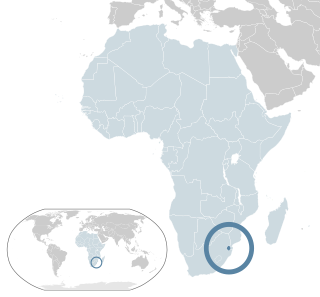
The International Lesbian, Gay, Bisexual, Trans and Intersex Association (ILGA) is a LGBTQ+ rights organization.

ILGA-Europe is the European region of the International Lesbian, Gay, Bisexual, Trans and Intersex Association. It is an advocacy group promoting the interests of lesbian, gay, bisexual, trans and intersex (LGBTI) people, at the European level. Its membership comprises more than 500 organisations from throughout Europe and Central Asia. The association enjoys consultative status at the United Nations Economic and Social Council and participatory status at the Council of Europe.

OutRight International (OutRight) is an LGBTIQ human rights non-governmental organization that addresses human rights violations and abuses against lesbian, gay, bisexual, transgender and intersex people. OutRight International documents human rights discrimination and abuses based on their sexual orientation, gender identity, gender expression and sex characteristics in partnership with activists, advocates, media, NGOs and allies on a local, regional, national and international level. OutRight International holds consultative status with ECOSOC.

Lesbian, gay, bisexual, and transgender (LGBT) people in Albania face legal challenges not experienced by non-LGBT residents, although LGBT people are protected under comprehensive anti-discrimination legislation. Both male and female same-gender sexual activities have been legal in Albania since 1995, but households headed by same-sex couples are not eligible for the same legal protections available to opposite-gender couples, with same-sex unions not being recognized in the country in any form.

Lesbian, gay, bisexual, and transgender (LGBT) people in Armenia face legal and social challenges not experienced by non-LGBT residents, due in part to the lack of laws prohibiting discrimination on the grounds of sexual orientation and gender identity and in part to prevailing negative attitudes about LGBT persons throughout society.

Lesbian, gay, bisexual, and transgender (LGBT) people in Azerbaijan face significant challenges not experienced by non-LGBT residents. Same-sex sexual activity has been legal in Azerbaijan since 1 September 2000. Nonetheless, discrimination on the basis of sexual orientation and gender identity are not banned in the country and same-sex marriage is not recognized.

Lesbian, gay, bisexual, and transgender (LGBT) people in Cape Verde are afforded some legal protections, and Cape Verde is considered a gay tolerant country. Homosexual activity has been legal in Cape Verde since 2004. Additionally, since 2008, employment discrimination on the basis of sexual orientation has been banned, making Cape Verde one of the few African countries to have such protections for LGBT people. Nevertheless, Cape Verde does not recognize same-sex unions or marriages, meaning that same-sex couples may still face legal challenges not experienced by non-LGBT residents. Households headed by same-sex couples are also not eligible for the same legal protections available to opposite-sex couples.
The Hirschfeld-Eddy Foundation (Hirschfeld-Eddy-Stiftung) was founded in Berlin in June 2007. It is a foundation focused on human rights of lesbian, gay, bisexual and transgender (LGBT) people.

Lesbian, gay, bisexual, and transgender (LGBT) people in Eswatini have limited legal rights. According to Rock of Hope, a Swati LGBT advocacy group, "there is no legislation recognising LGBTIs or protecting the right to a non-heterosexual orientation and gender identity and as a result [LGBT people] cannot be open about their orientation or gender identity for fear of rejection and discrimination". Homosexuality is illegal in Eswatini, though this law is in practice unenforced. According to the 2021 Human Rights Practices Report from the US Department of State, "there has never been an arrest or prosecution for consensual same-sex conduct."

Lesbian, gay, bisexual, and transgender (LGBT) people in Mozambique face legal challenges not faced by non-LGBT people. Same-sex sexual activity became legal in Mozambique under the new Criminal Code that took effect in June 2015. Discrimination based on sexual orientation in employment has been illegal since 2007.

Lesbian, gay, bisexual, and transgender (LGBT) people in North Macedonia face discrimination and some legal and social challenges not experienced by non-LGBT residents. Both male and female same-sex sexual activity have been legal in North Macedonia since 1996, but same-sex couples and households headed by same-sex couples are not eligible for the same legal protections available to opposite-sex married couples.
This is a timeline of notable events in the history of non-heterosexual conforming people of South Asian ancestry, who may identify as LGBTIQGNC, men who have sex with men, or related culturally-specific identities such as Hijra, Aravani, Thirunangaigal, Khwajasara, Kothi, Thirunambigal, Jogappa, Jogatha, or Shiva Shakti. The recorded history traces back at least two millennia.

Equal Ground is a non-profit advocacy organization based in Colombo, Sri Lanka, that campaigns for political, social and civilian rights for lesbian, gay, bisexual, transgender (LGBT), intersex and queer individuals. The organization, established in 2004, is one of the first organization in Sri Lanka welcoming and advocating equality for people of all sexual orientations and gender identities.
Kenita Placide is a human rights, HIV, and LGBT activist from St. Lucia. They are the founder and Executive Director the Eastern Caribbean Coordinator of Caribbean Forum for Liberation and Acceptance of Genders and Sexualities (CariFLAGS). Between 2014 and 2016, they served at the Women's Secretariat for the International Lesbian, Gay, Bisexual, Trans and Intersex Association. They have been on the forefront of bringing LGBT issues into discussion throughout the Anglo-Caribbean and international community.
Sexual minorities in Sri Lanka have been counted in recent times as consisting of as little as 0.035% of the population to as high as 19.6%. It is likely that there are around 1,100,000 according to current mapping conventions.
The Women's Support Group (WSG) is a Sri Lankan organisation dedicated to helping lesbian, bisexual and transgender women. It was set up in 1999 by amongst others Rosanna Flamer-Caldera. It has won the Felipa de Souza Award twice.
Companions on a Journey (CoJ) is a Sri Lankan LGBT support group founded in 1995. It campaigns to change the laws which criminalise homosexuality and to educate people about sexuality. The Women's Support Group grew out of CoJ, the two organisations sharing the Felipa de Souza Award in 2001. By 2014, CoJ had over 1,400 members and branches across the country.

Olena Olehivna Shevchenko is a Ukrainian women's and LGBT rights activist. After working as a teacher, she co-founded the NGO Insight in 2007 to advocate for LGBT inclusiveness on feminist platforms. She started annual events including Women's Day March, Transgender Day of Remembrance and the Festival of Equality, to protest against discrimination against women and the LGBT community in Ukraine and in other former Soviet countries. Her opponents have repeatedly attacked her and her events.












